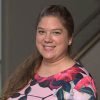Sarah Nagro’s first teaching gig was a sixth-grade special education class at the PS 45 International School in Buffalo. The class, a virtual United Nations, teemed with refugees, immigrants and an ethnically diverse mix of poor local residents from hardscrabble neighborhoods in a city still struggling to recover from deindustrialization in the last century.
The challenges were manifold. Many of her students had trouble speaking English, many couldn’t read, and all of them struggled with either learning or emotional disabilities. Some at the end of the year were old enough to drive.
The teaching was demanding enough. Keeping students on task is a perennial challenge for anyone in the profession, but this eclectic mix of students required that Nagro be part counselor, cheerleader and nurse. Some wanted to quit school rather than admit they couldn’t read; others masked their disabilities with the bravado acquired from the street. Then there was the paperwork.
Nagro had the benefit of working for a school whose very mission encourages multicultural perspectives and welcomes diversity, but her peers in public education aren’t so lucky. Many special educators leave the profession after three years feeling isolated, unsupported, overwhelmed and frustrated by the low pay and lack of respect, all of which has contributed to a national teacher shortage.
“It takes a unique person to have the right disposition to find success in that role,” said Nagro, who graduated from the School of Education’s doctoral program last May.
Nagro said she enjoyed the experience because she saw the difference she was making in students’ lives. “You have to get to know the students and build relationships with their families,” she said, “and understand what their needs are and how to help them.”
Given the grim realities of the profession, she was inspired to find better ways to prepare special education teachers for the demands of the career. So, in 2011, Nagro entered the Johns Hopkins doctoral program to study teacher preparation and special education. She had already acquired master’s degrees in childhood education and special education from D’Youville College in Buffalo.
As a doctoral student, she was selected to participate in a JHU Special Education, four-year U.S. Department of Education grant focusing on teacher preparation and the use of evidence-based practices in special education. She sought out experts in the field and absorbed the scholarly literature and research that would inform a better process for preparing teachers to educate students with special needs.
As part of her doctoral training, Nagro then had the opportunity to apply that knowledge in the classroom when she taught courses for master’s students at the School of Education in Math Methods for Students with Mild/Moderate Disabilities; Reading Methods for Students with Mild/Moderate Disabilities; and the Student Internship Experience.
For her dissertation, she worked with six of the seven teacher preparation programs at Hopkins to investigate the reflective practice of preservice teachers. The purpose of her quasi-experimental study was to understand the effects of guided video analysis on teacher candidates’ reflective ability and instructional skills during student-teaching field experiences that included students with disabilities.
Reflection and video recording activities were combined to promote critical thinking and improved instructional skills during video analysis. Thirty-six teacher candidates with similar prior experience were split into two groups. Both groups participated in semester-long field experiences where candidates video-recorded their instruction four times and wrote corresponding reflections. Participants in both groups felt they made significant improvements in their teaching ability, but only the group given guidance in how to reflect demonstrated significant growth in reflective ability and instructional skills over time.
“In our teacher preparation programs, we need to look at not only what we are asking our students to do, but how we are guiding them through these activities,” said Nagro. “We want to improve their teaching abilities and increase their level of knowledge and understanding of the field.”
Last November, Nagro was the sole recipient of the 2015 Dissertation Award given by the Teacher Education Division of the Council for Exceptional Children at its annual conference in Tempe, Arizona. This prestigious national award recognizes doctoral students for their dissertation investigations and contributions to the field of special education.
“Sarah’s dissertation research on videotaping of preservice teachers during their field experiences will change how we in the field of special education guide teachers,” said Laurie deBettencourt. “Her results will influence how we collect data on the changes teachers make.”
After graduating from the School of Education, Nagro joined George Mason University as a tenure-track assistant professor where she continues to conduct research on teacher preparation in special education. “I hope I’m making a difference in the field and helping the learning experiences of students with disabilities by improving the teachers who are entering the classroom,” she said. “I’m hoping to make positive changes for kids.”
She credited deBettencourt with instilling the notion that special educators should be leaders in the field and advocates for themselves and students with disabilities.
“The culture of excellence is pervasive at the JHU School of Education,” said Nagro. “You are among people who are at the top of their field. It really does rub off. If you want to be a leader in the field, you should be with the best. That’s what I think Johns Hopkins is about. I feel like I entered the field at a great advantage.”

